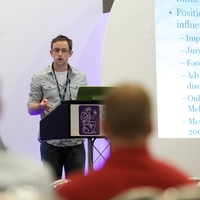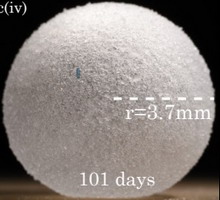
Research that makes people laugh and then think
 Andrew Johnson  Lara Tucha  William Simpson |
The press about science and not only  Chewing Gum and CognitionYou can chew this cud for a long time Psychologists Kate Morgan, Cardiff University, Andrew Johnson, Chris Miles, Bournemouth University, England, published the study "Chewing gum moderates the vigilance decrement" in the "British journal of psycholog", 2014, May, 105 (2): 214-25. The authors studied the effect of chewing gum on the tasks of care, which require constant updating of short-term memory. The study involved 38 students divided into two groups. One group chewed the cud in its entirety, and the other did not give the cud. Both groups completed a 30-minute audio task, which included listening to a list of numbers from 1 to 9, read in random order. Participants were judged by how accurately and quickly they were able to detect a sequence of even-odd numbers, for example, 7-2-1. The number of sequences detected and the reaction time were indexed. The results showed that participants who chewed the cud had faster reaction times and more accurate results than participants who did not chew the cud. This is especially true for the last parts of the task. Interestingly, the participants who did not chew the cud, performed a little better at the beginning of the task, but by the end began to lag behind. Chewing gum thus helps to focus on tasks that require constant monitoring over a longer period of time. The results are consistent with data from Lara Tucha, University of Groningen, The Netherlands, William Simpson, University of Plymouth, England, 2011,"Appetite", 56, 299 –301. This paper demonstrates the beneficial effects of chewing gum in the final stages of the 30-minute visual attention task. Although chewing gum has a detrimental effect on attention in the earlier stages of the task, significant positive effects on attention have been observed in the later stages. The work of "Gum Chewing and Cognition: An Overview", Lara Tucha, Janneke Koerts, "Neuroscience & Medicine", 2012, 3, 243-250 cannot be ignored. The authors studied a total of 26 works, including the words - chewing gum - combined with search terms - cognition, memory, learning, attention. It turned out that in recent years there has been a discussion about the effect of chewing gum on various aspects of cognitive functioning. There is a clear indication that chewing gum can improve various aspects of cognitive functioning, including memory, attention, and executive and intellectual functioning. However, there is also clear evidence that chewing gum during cognitive tasks can negatively affect the execution of the task. Thus, it can be concluded that copying (beneficial or harmful) the effects of chewing gum on cognitive abilities was very difficult. Therefore, the reliability of the reported effects of chewing gum on cognitive ability should, one way or another, be questioned. And the last. Andrew Allen, National University of Ireland, Andrew Smith, Cardiff University, "Chewing Gum: Cognitive Performance, Mood, Well-Being, and Associated Physiology." We studied the effect of chewing gum Wrigley's Spearmint on mood in the absence of the assignment, the effect of speed and chewing power on mood and attention, the effect of chewing gum during one working day on well-being and performance, as well as post-work mood and cognitive abilities were evaluated. The speed of chewing and the subjective power of chewing did not affect mood, but had a limited effect on attention. Chewing gum during work hours was associated with higher productivity and less cognitive problems. The results emphasize that Wrigley's chewing gum can weaken alertness, and this suggests that chewing gum increases productivity. You can chew this gum for a long time.
Источник - пресса |
| (c) 2010-2024 ig-nobel.ru | ig-nobel@mail.ru |

